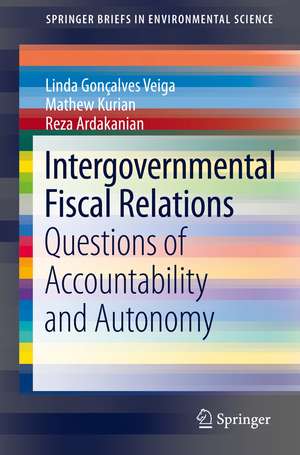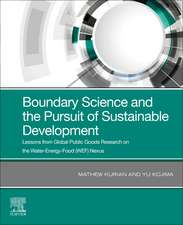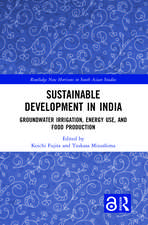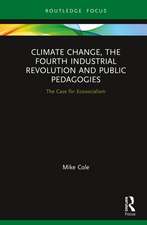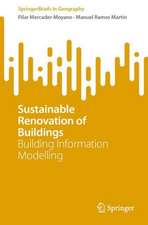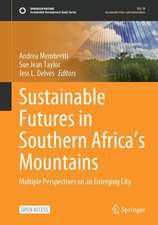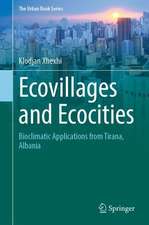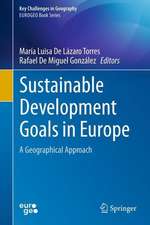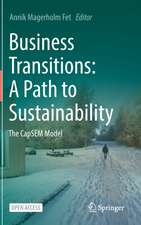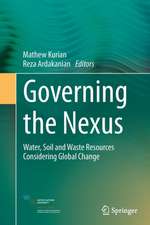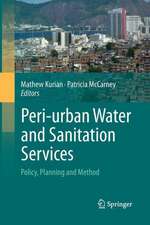Intergovernmental Fiscal Relations: Questions of Accountability and Autonomy: SpringerBriefs in Environmental Science
Autor Linda Gonçalves Veiga, Mathew Kurian, Reza Ardakanianen Limba Engleză Paperback – 29 aug 2014
Coverage includes optimal arrangements for sharing fiscal responsibilities among different levels of government, the potential impact of decentralization on the quality of public goods delivery, local governments’ expenditure and revenue choices, and the effect of decentralization on accountability, governance and policy outcomes. The scope of discussion extends to both public finance theory and applied policy debates.
The first chapter, on trends in financing of public services, opens with an explanation of the how and why of government intervention in the economy, the nature and purposes of transfers between and among governments and trends in decentralization. Case studies examine the impact of decentralization in such areas as service delivery, water and sanitation, education and health, and on poverty and income inequality.
Chapter 2 examines public budgets: governance structures, norms and organizational practices, building up understanding of budgets, budget cycles, fiscal revenues from fees and taxes, expenses, debt and political economy issues, rules mandating balanced budgets in government and more.
Chapter 3 discusses issues of accountability and policy outcomes, offering important lessons from recent international experience, including ways to strengthen political, administrative and financial accountability. The concluding chapter recounts lessons from recent international experience and surveys implications for the nexus approach to management of environmental resources.
The information, analysis and expert advice presented here is particularly relevant for developing and emerging countries, where well designed decentralization reforms have a higher potential to improve efficiency in the provision of public services, and to enhance the development of integrated and sustainable strategies for the use of water, soil and waste resources and applications that advance the nexus approach.
Din seria SpringerBriefs in Environmental Science
-
 Preț: 348.77 lei
Preț: 348.77 lei -
 Preț: 382.57 lei
Preț: 382.57 lei -
 Preț: 378.12 lei
Preț: 378.12 lei -
 Preț: 378.80 lei
Preț: 378.80 lei -
 Preț: 381.98 lei
Preț: 381.98 lei -
 Preț: 347.80 lei
Preț: 347.80 lei - 15%
 Preț: 464.18 lei
Preț: 464.18 lei -
 Preț: 378.12 lei
Preț: 378.12 lei -
 Preț: 377.53 lei
Preț: 377.53 lei -
 Preț: 379.09 lei
Preț: 379.09 lei -
 Preț: 381.00 lei
Preț: 381.00 lei -
 Preț: 383.93 lei
Preț: 383.93 lei -
 Preț: 175.58 lei
Preț: 175.58 lei -
 Preț: 475.83 lei
Preț: 475.83 lei -
 Preț: 380.07 lei
Preț: 380.07 lei -
 Preț: 378.92 lei
Preț: 378.92 lei -
 Preț: 411.93 lei
Preț: 411.93 lei -
 Preț: 375.62 lei
Preț: 375.62 lei -
 Preț: 375.45 lei
Preț: 375.45 lei -
 Preț: 378.92 lei
Preț: 378.92 lei -
 Preț: 377.57 lei
Preț: 377.57 lei -
 Preț: 377.35 lei
Preț: 377.35 lei -
 Preț: 378.34 lei
Preț: 378.34 lei -
 Preț: 344.67 lei
Preț: 344.67 lei -
 Preț: 374.30 lei
Preț: 374.30 lei -
 Preț: 362.43 lei
Preț: 362.43 lei -
 Preț: 446.26 lei
Preț: 446.26 lei - 5%
 Preț: 361.96 lei
Preț: 361.96 lei -
 Preț: 376.43 lei
Preț: 376.43 lei -
 Preț: 380.63 lei
Preț: 380.63 lei -
 Preț: 375.84 lei
Preț: 375.84 lei - 15%
 Preț: 463.20 lei
Preț: 463.20 lei -
 Preț: 383.33 lei
Preț: 383.33 lei -
 Preț: 375.23 lei
Preț: 375.23 lei -
 Preț: 377.57 lei
Preț: 377.57 lei -
 Preț: 381.59 lei
Preț: 381.59 lei -
 Preț: 379.48 lei
Preț: 379.48 lei -
 Preț: 413.84 lei
Preț: 413.84 lei -
 Preț: 381.81 lei
Preț: 381.81 lei -
 Preț: 352.28 lei
Preț: 352.28 lei -
 Preț: 381.81 lei
Preț: 381.81 lei -
 Preț: 381.98 lei
Preț: 381.98 lei - 5%
 Preț: 331.65 lei
Preț: 331.65 lei -
 Preț: 375.62 lei
Preț: 375.62 lei -
 Preț: 377.95 lei
Preț: 377.95 lei -
 Preț: 413.45 lei
Preț: 413.45 lei -
 Preț: 267.16 lei
Preț: 267.16 lei -
 Preț: 373.72 lei
Preț: 373.72 lei -
 Preț: 375.62 lei
Preț: 375.62 lei
Preț: 376.04 lei
Nou
Puncte Express: 564
Preț estimativ în valută:
71.95€ • 75.13$ • 59.55£
71.95€ • 75.13$ • 59.55£
Carte tipărită la comandă
Livrare economică 04-18 aprilie
Preluare comenzi: 021 569.72.76
Specificații
ISBN-13: 9783319062952
ISBN-10: 3319062956
Pagini: 69
Ilustrații: XI, 69 p. 14 illus., 13 illus. in color.
Dimensiuni: 155 x 235 x 12 mm
Greutate: 0.13 kg
Ediția:2015
Editura: Springer International Publishing
Colecția Springer
Seria SpringerBriefs in Environmental Science
Locul publicării:Cham, Switzerland
ISBN-10: 3319062956
Pagini: 69
Ilustrații: XI, 69 p. 14 illus., 13 illus. in color.
Dimensiuni: 155 x 235 x 12 mm
Greutate: 0.13 kg
Ediția:2015
Editura: Springer International Publishing
Colecția Springer
Seria SpringerBriefs in Environmental Science
Locul publicării:Cham, Switzerland
Public țintă
Professional/practitionerCuprins
PART I: Trends in Financing of Public Services.- 1. Government Intervention in the Economy.- 2. Multi-Level System of Government.- 3. Worldwide Trends in Decentralization.- PART II: Public Budgets: Governance Structures, Norms and Organizational Practices.- 1. Budget Basics.- 2. Expenditure Responsibilities.- 3. Subnational Governments’ Fiscal Autonomy.- 4. Debt.- PART III: Issues of Accountability and Policy Outcomes - Key Lessons From Recent International Experience.- 1. Accountability, Governance and Public Expenditure Efficiency.- 2. Decentralization and Local Accountability.- 3. Decentralization and Governance.- 4. Accountability, Governance and Policy Outcomes.
Notă biografică
Prof. Dr. Reza Ardakanian is the Founding Director of United Nations University Institute for Integrated Management of Material Fluxes and of Resources (UNU-FLORES). He served as Director of the UN-Water Decade Programme on Capacity Development hosted by UNU (2007–2015) and as Vice-Rector of UNU in Europe, ad interim (2009–2011). He sat on the Boards of various international programmes/organisations such as UNESCO-IHP, UNESCO-IHE, the International Hydropower Association, and UNU-EHS. Prof. Dr. Ardakanian holds a PhD in Water Resources Management from McMaster University (Canada) and is a faculty member of Sharif University of Technology in Tehran, Iran. He formerly held a number of national offices in Iran, including Deputy Minister for Water Affairs (2001–2005), Senior Vice-Minister (1998–2001) and Deputy Minister for Planning & Economic Affairs (1989–1991) with the Ministry of Energy, and Deputy Minister for Urban Development and Municipalities with the Ministry of Interior (1987–1989).
Dr. Mathew Kurian is Academic Officer and leads the Capacity Development and Governance unit at United Nations University Institute for Integrated Management of Material Fluxes and of Resources (UNU-FLORES). Prior to joining UNU-FLORES, he served as Senior Water and Sanitation Specialist at Water and Sanitation Programme (WSP) of The World Bank where he led policy advocacy efforts related to rural water supply, wastewater reuse, and climate adaptation options in secondary towns. He began his career as a Robert McNamara Fellow at the World Bank where his work on land tenure reform was hosted by the Tata Energy Research Institute (TERI), New Delhi.
Upon completing his PhD in Development Studies from the Institute of Social Studies (ISS), Erasmus University, The Hague, Netherlands, Dr. Kurian was employed as Associate Expert (Dutch Ministry of Foreign Affairs) at International Water Management Institute (IWMI-CGIAR) where he undertook assessments of soil and water conservation interventions in the Mekong and Nile river basins. In 2009 as member of faculty at UNESCO-IHE, Delft, Dr. Kurian led the development of a policy note on urban sanitation and the Millennium Development Goals (MDGs) for the Directorate General of International Cooperation (DGIS) in the Netherlands. While still at UNESCO-IHE, Dr. Kurian developed an online e-learning course on governance of water and sanitation services in developing countries.
He has published in the area of water institutions and policy and has mentored students of the MSc programme in environment and development planning while on the faculty of University College London (UCL). His experience in the field of capacity development includes training civil servants and managers of water utilities in Iran and Tanzania, consulting assignments with the Asian Development Bank (ADB), Philippines and teaching undergraduate courses in human geography at the University of British Columbia (UBC) Vancouver, Canada. In his current function, he leads the design of public policy research, policy advocacy in support of evidence-based decision making and fund raising to support establishment of a nexus observatory network.
Upon completing his PhD in Development Studies from the Institute of Social Studies (ISS), Erasmus University, The Hague, Netherlands, Dr. Kurian was employed as Associate Expert (Dutch Ministry of Foreign Affairs) at International Water Management Institute (IWMI-CGIAR) where he undertook assessments of soil and water conservation interventions in the Mekong and Nile river basins. In 2009 as member of faculty at UNESCO-IHE, Delft, Dr. Kurian led the development of a policy note on urban sanitation and the Millennium Development Goals (MDGs) for the Directorate General of International Cooperation (DGIS) in the Netherlands. While still at UNESCO-IHE, Dr. Kurian developed an online e-learning course on governance of water and sanitation services in developing countries.
He has published in the area of water institutions and policy and has mentored students of the MSc programme in environment and development planning while on the faculty of University College London (UCL). His experience in the field of capacity development includes training civil servants and managers of water utilities in Iran and Tanzania, consulting assignments with the Asian Development Bank (ADB), Philippines and teaching undergraduate courses in human geography at the University of British Columbia (UBC) Vancouver, Canada. In his current function, he leads the design of public policy research, policy advocacy in support of evidence-based decision making and fund raising to support establishment of a nexus observatory network.
Caracteristici
Discusses the financial inter-relationships between different levels of government for management of environmental resources, notably water and waste Describes and assesses international experiences in the field of decentralization, and identifies best practices Critically analyzes and applies key concepts related to the supply of public goods in multilevel systems of government Includes supplementary material: sn.pub/extras
